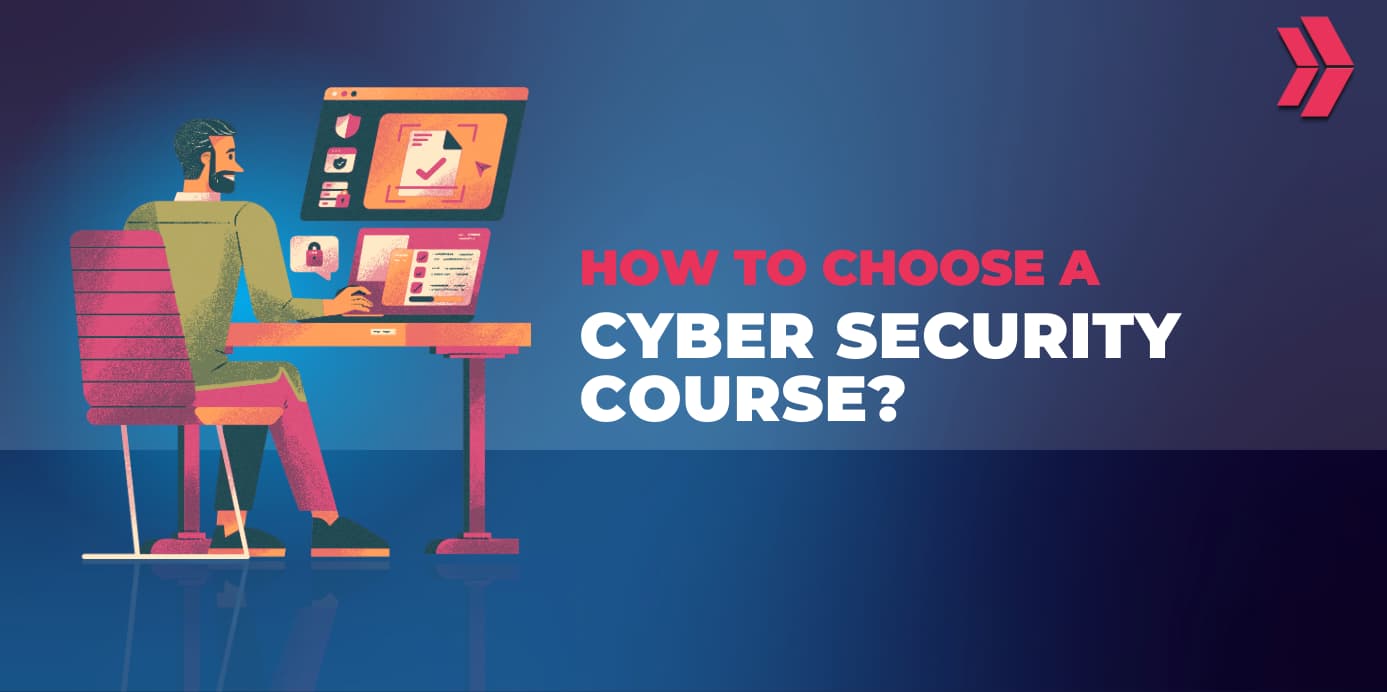Cybersecurity ethics provides the confidentiality, integrity, and availability of sensitive assets. Ethics in cybersecurity is essential to enhance the overall security posture and protect personal and other digital information. Learning cyber security ethics and its applications will effectively address cybersecurity issues and ensure privacy.
Cybersecurity ethics is indispensable for safeguarding information, maintaining reputation, and upholding regulatory requirements. Professionals should understand and apply ethical practices in cybersecurity to overcome ethical challenges. Interestingly, the cyber offense reporting rate is about 25%, according to Cybersecurity Ventures 2024 forecasts. This low reporting statistic underscores the requirement for strong ethical frameworks and practices.
Cybersecurity professionals face various dilemmas of security in their daily routines. Cyber ethics consists of 7 principles to prepare against the threat landscape: accountability, transparency, confidentiality, integrity, availability, compliance, and continuous learning.
Cybersecurity training and awareness programs improve professional capabilities and foster best practices. Additionally, utilizing educational programs to advance cybersecurity knowledge promotes ethical compliance and encourages continuous learning.
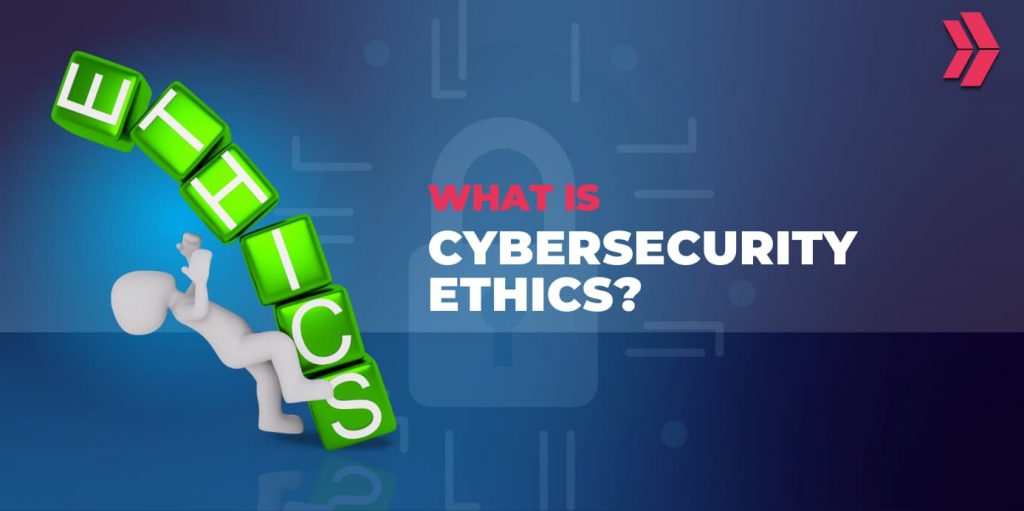
What is Cybersecurity Ethics?
Cybersecurity ethics is the practice of protecting data, networks, and systems in accordance with moral principles and judgments. Ethics in cybersecurity encompasses social and legal considerations in security practices.
Organizations may adopt different codes of ethics based on factors such as culture, size, geography, and financial power because the definitions and applications of cybersecurity ethics vary widely. It is important to address ethical issues and create a resilient cyberspace.
Why Are Ethics in Cyber Security Important?
Ethics in cybersecurity is important for providing confidentiality, integrity, and availability of digital assets. Leveraging cybersecurity tools and technologies requires the use of ethical regulations and measures. Ethics in cybersecurity enhances professionalism and helps preempt and respond to cyber threats. It also ensures compliance with cybersecurity laws and standards.
Cyber security and ethics are interconnected terms that support the loyalty and trust between parties. For instance, an ethical hacker should consider ethical factors when identifying and disclosing vulnerabilities.
What Are the 7 Core Principles of Cybersecurity Ethics?
Here are the 7 core principles of cybersecurity ethics:
- Accountability
- Transparency
- Confidentiality
- Integrity
- Availability
- Compliance
- Continuous Learning
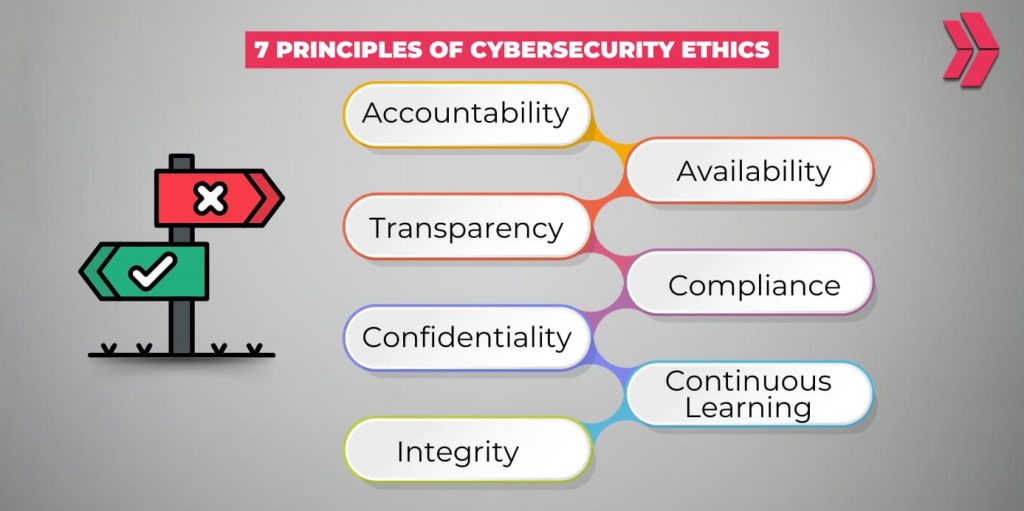
Accountability
Accountability ensures that professionals are responsible for their job-related actions. User activities should be properly logged to provide non-repudiation and hold individuals accountable for legal consequences.
Transparency
Transparency significantly enhances credibility and collaboration in cybersecurity ethics. It is closely related to accountability and establishes trust between parties by open information-sharing procedures.
Confidentiality
Confidentiality refers to keeping sensitive information secure from unauthorized access. It is vital for safeguarding privacy, mitigating risks, and preserving trust to address cybersecurity ethical implications.
Integrity
Integrity validates that data is accurate and has not been intentionally or accidentally deleted or modified. Ethical integrity helps identify data tampering and maintaining the chain of custody.
Availability
Availability is the state of being in operation when authorized users need it. It only allows permitted users to access the data and resources. High availability and timely response to requests are indispensable for business continuity.
Compliance
Compliance describes the efforts to conform to standards, laws, and regulations to improve overall protection. It includes adopting cybersecurity best practices to prevent attacks, refrain from financial losses, and maintain reputation.
Continuous Learning
Continuous learning is instrumental in coping with the latest threats and ethical issues. Security experts should regularly update playbooks and plans. Moreover, personnel education and awareness training should be customized to address specific needs.
What are the 5 Common Ethical Issues in Cybersecurity?
Here are the 5 common ethical issues in cybersecurity:
- Privacy intrusion
- Risk management
- Possibility of disinformation
- Transparency and accountability
- Compliance and auditing
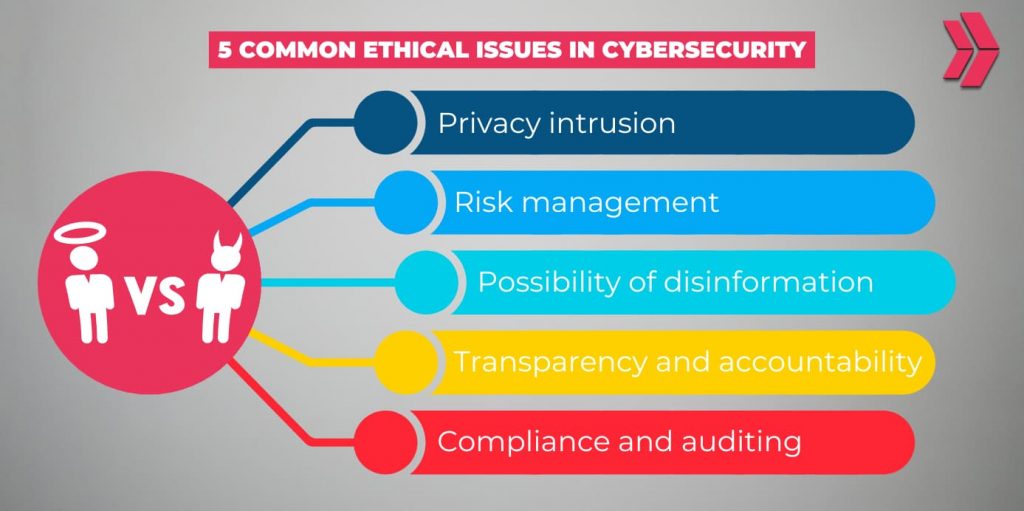
Privacy Intrusion
While cybersecurity professionals monitor systems and network activities, they can witness personal or sensitive information collected or stored. The human factor can result in privacy intrusion and lead to the disclosure of sensitive information.
Risk Management
Risk management properly uses limited resources and prioritizes cyber risks to enhance overall security. Wrong or ineffective risk management may damage vulnerability identification, proactive defense efforts, and incident response capabilities.
Possibility of Disinformation
Disinformation intentionally spreads false information, which is a severe problem in cyberspace ethics. Technological advancements can cause harm or deceive the target with manipulated or fabricated information and content.
Transparency and Accountability
Transparency establishes reputation and trust between parties. It is the openness in the information-sharing process and all actions. Furthermore, professionals should be accountable for their actions and sanctioned for deviant behaviors.
Compliance and Auditing
Organizations should comply with regional and international regulations and laws for system hardening and establishing the best standards. Similarly, internal and external audits help identify vulnerabilities, weaknesses, and non-confirmative actions in cyberspace ethics.
What are the Ethical Challenges Faced by Cybersecurity Professionals?
Here are the 5 ethical challenges faced by cybersecurity professionals:
- Poor security
- Privacy concerns
- Evolving technology
- Information disclosure
- Ethics education
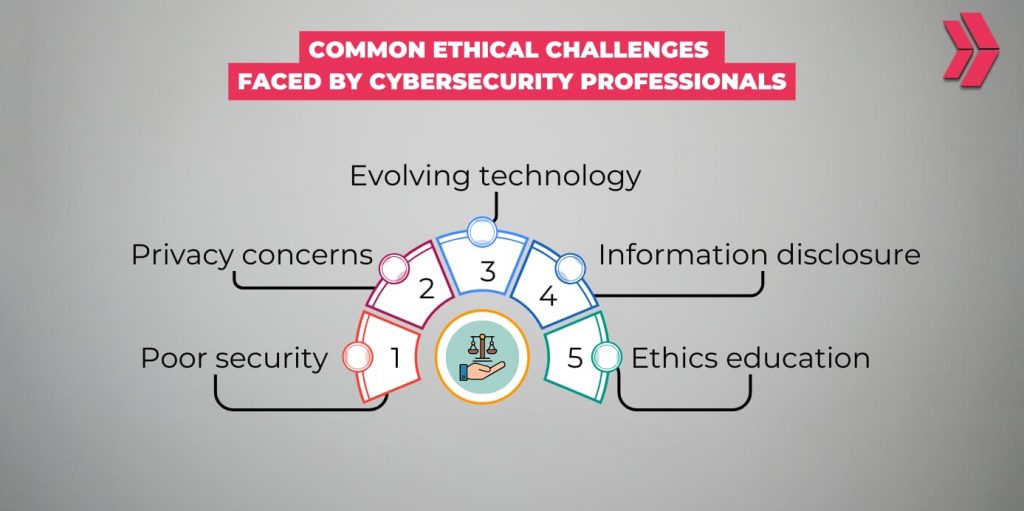
Poor Security
Insufficient security controls and practices weaken the security posture, including ineffective implementation of security measures, misconfiguration, weak vulnerability management, improper use of tools, and inefficient use of resources.
Privacy Concerns
Cybersecurity experts should protect digital data from unauthorized access. Similarly, professionals should respect and protect privacy at any cost when they encounter personal or sensitive data throughout the monitoring process.
Evolving Technology
Technological advancements, such as sophisticated tools or artificial intelligence, can compromise security ethics by being a force multiplier for attackers, using misinformation or disinformation techniques, and violating privacy.
Information Disclosure
Information disclosure is one of the biggest dilemmas of security. Organizations should balance transparency and privacy. Additionally, they should sufficiently inform relevant parties and adhere to legislation. Disclosure is controversial; for example, people have different opinions about whistleblowers.
Ethics Education
A lack of cybersecurity ethics education can have various side effects, including violating privacy, misusing tools and technologies, enhancing attack surface, losing trust, and eventually causing legal consequences. Ethics awareness training can bolster security efforts.
How Can Organizations Promote Ethical Practices in Cybersecurity?
Cybersecurity and ethics are inseparable terms that are essential to overall security. Organizations can promote ethical practices in cybersecurity by adopting the following principles: devising a culture of ethics in the workplace, creating a comprehensive code of ethics, integrating ethics awareness and training, encouraging continuous learning, embracing transparency, and evaluating risks regularly.
How Do Training and Awareness Contribute to Ethical Compliance?
Cybersecurity training contributes to cybersecurity compliance efforts by addressing ethical dilemmas and enhancing personnel capabilities. Furthermore, a focused cybersecurity course helps to acquire cybersecurity best practices and implement robust frameworks.
On the other hand, ethical awareness helps identify, prevent, and report ethical issues. It also encourages an ethical culture in the organization and enables moral actions in security operations.
What is the Contribution of Educational Programs to Ethics in Cybersecurity?
Educational programs contribute to ethics in cybersecurity by enhancing skills and knowledge. Educational programs promote accountability, raising awareness, and continuous learning to create a robust cyber security code of ethics. Furthermore, leveraging educational programs for advancing cybersecurity knowledge helps employ best practices and the latest technologies.
Conclusion
Cybersecurity ethics is instrumental in protecting personal data and sensitive digital information. It confirms the availability, integrity, and confidentiality of digital assets. Security experts utilize the 7 core principles of cybersecurity ethics to respond to evolving cybersecurity challenges, which are accountability, transparency, confidentiality, integrity, availability, compliance, and continuous learning.
Cybersecurity professionals regularly encounter ethical challenges in daily operations, including privacy intrusions, security vulnerabilities, harmful impacts of technological advancements, issues with disclosure procedures, and a lack of ethics education.
Ethics in cybersecurity is indispensable, and organizations can promote ethical practices by embracing an explicit code of ethics and developing an ethical culture in the workplace. Cybersecurity training and awareness programs also enhance capabilities and boost ethical compliance.



